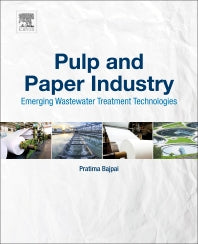Freshly Printed - allow 10 days lead
Couldn't load pickup availability
Pulp and Paper Industry
Emerging Waste Water Treatment Technologies
Discusses the novel measures adopted by the pulp and paper industry to reduce water consumption and treat wastewater for reuse
Pratima Bajpai (Author)
9780128110997, Elsevier Science
Paperback, published 6 March 2017
228 pages
23.4 x 19 x 1.6 cm, 0.5 kg
Pulp and Paper Industry: Emerging Waste Water Treatment Technologies is the first book which comprehensively reviews this topic. Over the past decade, pulp and paper companies have continued to focus on minimizing fresh water use and effluent discharges as part of their move towards sustainable operating practices. Three stages—basic conservation, water reuse and water recycling—provide a systematic approach to water resource management. Implementing these stages requires increased financial investment and better utilization of water resources. The ultimate goal for pulp and paper companies is to have effluent-free factories with no negative environmental impact. The traditional water treatment technologies that are used in paper mills are not able to remove recalcitrant contaminants. Therefore, advanced water treatment technologies are being included in industrial wastewater treatment chains aiming to either improve water biodegradability or its final quality. This book discusses various measures being adopted by the pulp and paper industry to reduce water consumption and treatment techniques to treat wastewater to recover it for reuse. The book also examines the emerging technologies for treatment of effluents and presents examples of full-scale installations.
1. Introduction 2. The pulp and paper industry3. Best available techniques (BAT) 4. Water use in pulp and paper processes 5. Measures to reduce water consumption6. Current external wastewater treatment7. Emerging waste water treatment technologies8. Examples of full-scale installations9. Future perspectives
Subject Areas: Chemical engineering [TDCB], Industrial chemistry [TDC]


